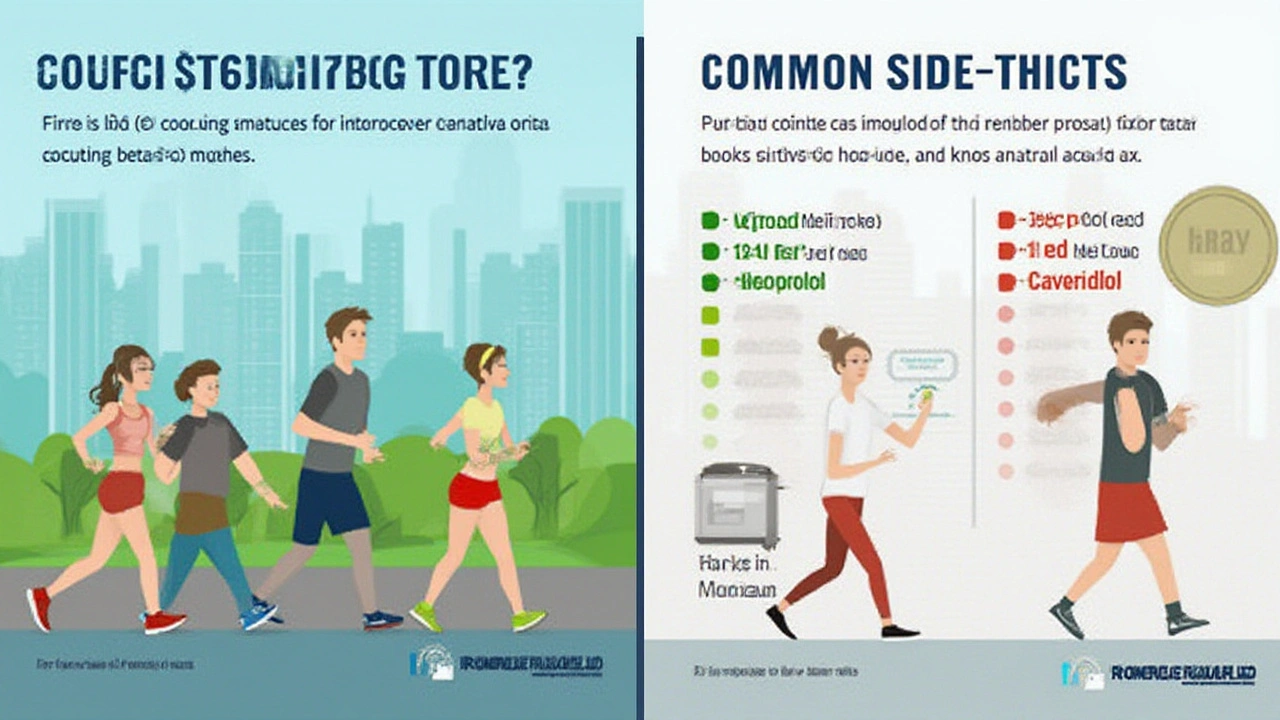Imagine you're handed a little white pill for your high blood pressure or heart rhythm problem. The doctor says, “It's a beta-blocker. You'll feel better.” But at the pharmacy, you catch the names—metoprolol, bisoprolol, carvedilol, atenolol, nebivolol—do they all do the same thing? Are the side effects just as bad (or not bad at all) for each one? Picking the right beta-blocker can be more confusing than picking a streaming subscription, and honestly, who wants to gamble with their heart health?
Turns out, all beta-blockers are not clones of each other. Each has its quirks—how fast it drops your heart rate, what it does to your blood pressure in real life (not just in charts), and how likely it is to trip you up with dizziness or fatigue. Some beat out others in specific heart conditions, and some let you get away with fewer daily doses. By the time you finish reading, you’ll know which drug pulls ahead, which slips behind, and which might be your match—because no one wants to be left guessing with their ticker.
How Beta-Blockers Work: Same League, Different Players
Beta-blockers are the trusted old guard for treating high blood pressure, angina, irregular heartbeats, and heart failure. But here’s the twist: not all beta-blockers work equally on every target. The main job they do? Blocking those adrenaline (beta-adrenergic) receptors in your heart and blood vessels so your heart slows down and your arteries relax. But how they go about this—well, that’s where things get interesting.
Metoprolol and bisoprolol are “cardioselective,” meaning they mostly stick to receptors in your heart. That usually means fewer side effects like cold fingers or problems breathing because they don’t mess as much with lung or blood vessel receptors. Carvedilol, on the other hand, blocks both beta and alpha receptors—so it works on the heart and also widens your blood vessels a bit more.
Here's a quick breakdown that covers what really separates these three:
| Drug | Receptor Target | Dosing Frequency | Key Features |
|---|---|---|---|
| Metoprolol | Beta-1 (heart) | Once or twice daily | Good for high blood pressure, post-heart attack |
| Bisoprolol | Beta-1 (heart, more selective than metoprolol) | Once daily | Longer acting, often fewer side effects |
| Carvedilol | Beta-1, Beta-2, Alpha-1 | Twice daily | Extra benefit in heart failure Good for lowering BP in tough cases |
This all boils down to how much each drug slows your heart, lowers your pressure, and whether it leaves you feeling tired or just normal again. But, there’s more to the story once you look at head-to-head studies.
Heart-Rate and Blood Pressure: Which Beta-Blocker Works Hardest?
Most people want to know which drug actually works. For heart-rate control—which helps in things like atrial fibrillation or after a heart attack—metoprolol and bisoprolol stack up close, but bisoprolol edges ahead just a bit in many studies. Why? It locks onto beta-1 receptors with more precision and tends to keep that steady heart-calming effect for a full 24 hours, even at a single daily dose.
Metoprolol, especially its long-acting (succinate) form, is great for common blood pressure issues and arrhythmias. In practice, it can sometimes need dosing twice a day for full effect, especially if you’re sensitive to swings in your readings. The difference isn’t huge, though—some people do just fine once a day, and, honestly, a lot depends on your genes and metabolism more than the textbook says.
Carvedilol? This one's the heavy hitter if you’re dealing with heart failure. Its combo of beta and alpha blockade not only slows the heart but also guts your blood pressure by relaxing arteries. In direct comparisons with metoprolol in patients with heart failure, carvedilol often shows a bigger boost in survival stats and a lower risk of hospital visits. For people chiefly worried about blood pressure, carvedilol’s double action means it can drop blood pressure a little more than the other two—but it’s also more likely to cause a blood pressure drop that feels like you stood up too fast after a nap.
There’s one more worth mentioning here: nebivolol. It’s the “new kid” with bonus effects on blood vessels, releasing nitric oxide and further relaxing arteries. Early studies make it look especially gentle for people who can’t stand typical side effects, but it’s pricier and still proving itself in real-world comparisons.
It’s not just about what’s best on a chart. Some folks need steady heart rate control and don’t care if their BP only drops a little; others want the blood pressure fall without turning into a zombie. Personal tolerance and life details matter.

Side Effects: Who Handles Them Best?
Ask anyone who’s ever taken a beta-blocker why they stopped, and you’ll probably hear the same complaints: crushing fatigue, ice-cold hands, weird dreams, or feeling like they aged forty years overnight. But here's the secret: side effects vary far more than you think—between drugs, doses, and people.
Metoprolol and bisoprolol are similar, but bisoprolol is usually smoother. Patient surveys and reviews in heart clinics often point to bisoprolol as causing less daytime sleepiness, less sex drive trouble, and fewer nightmares. Some cardiologists call it their “go-to” for newbies worried about quality of life, mainly because its higher selectivity avoids hitting other body systems as much.
Switching from metoprolol to bisoprolol isn’t always needed, but it’s pretty common when people just can’t shake fatigue or mild depression. Side effects aren’t just about the chemical; small tweaks in dose or formulation (like switching to long-acting metoprolol succinate instead of tartrate) can lessen issues, too.
Carvedilol, with its broader coverage, might bring on dizziness or lightheadedness—especially after dose increases. Diarrhea or weight gain is more likely, but so is a bigger survival benefit for some heart failure patients willing to roll with those issues.
Tips for beta-blocker tolerability? Start low, go slow. Most side effects show up fast and fade as your body adjusts, but if you’re miserable after a few weeks, don’t soldier through. There are more options out there than ever, and swapping is common. For a deeper look at switching options and personal experiences, check out these metoprolol alternatives—especially if you haven’t been happy with your results so far.
One myth still lingers: all beta-blockers make you gain weight. The data’s actually murky (no one really gains 20 pounds from these alone), but it’s definitely easier to skip the gym or feel less motivated when energy dips, especially early on. Stay alert to energy, mood, and sleep, and ask for tweaks when you need them.
Making Your Beta-Blocker Pick: Questions, Quirks, and Pro Tips
So who comes out on top: metoprolol, bisoprolol, or carvedilol? Like coffee blends, the best “roast” depends on your taste—and your medical background. If you’re mostly after blood pressure control and side effect peace, bisoprolol is the favorite for many. For post-heart attack care or rhythm control, metoprolol has a proven decade-long track record. For heart failure, carvedilol’s extra punch can honestly make a survival difference. Still confused? You’re not alone—doctors constantly swap choices as new research rolls in and as patients’ lives shift.
Here’s what works in real life:
- If fatigue has knocked you out, ask about bisoprolol or the extended-release form of metoprolol.
- If you have asthma or bad lungs, cardioselective options (metoprolol, bisoprolol) usually cause fewer breathing issues than carvedilol.
- If your main fight is heart failure hospitalization, carvedilol is the front runner, but only if you can stick with its side effects.
- If money is tight, metoprolol and bisoprolol are typically cheap generics; carvedilol is getting there, but not always.
- Older folks may do better on once-daily meds to keep things simple—again, a plus for bisoprolol and (sometimes) metoprolol succinate.
- If you need frequent up-and-down dose adjustment (like after surgery), shorter-acting drugs give your doctor more control—think metoprolol tartrate.
Ask for shared decision-making, not just a prescription. Keep a symptom diary and bring it to check-ins. And never stop beta-blockers suddenly; your heart actually amps up its sensitivity and can flip into dangerous rhythms without a proper taper.
One last pro tip: use a pill organizer or med reminder (old-fashioned sticky note on the coffee pot works too). The most effective drug is always the one you actually take.
Your heart, your life. Trust the evidence, but don’t ignore your own experience along the way. The “right” beta-blocker changes as you change—so don’t settle for feeling worse than you have to.

